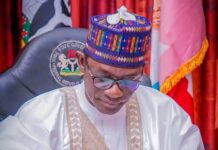From the northern and eastern angles of Potiskum, one could assume that the town is a giant mechanical workshop. There are trailers by the side of the road. There are trailers in front of and within large mechanical workshops. There are many workshops at various stages of constructing the bodies of the trailer.
In fact, there are trailers and bodies of trailers almost everywhere. Some of the trailers are loaded with vegetables, others with cattle, dried fish and grains; all ready to head in different directions across the lengths and breadths of Nigeria. Also, some of the trailers are loaded with onions, another batch with cattle, and then with grains, etc.
There are so many trailers in Potiskum, to the extent that one can easily assume that all the trailers plying Nigeria’s highways start their journies from Potiskum. If one reckons with the economic importance of transporting goods from one part of Nigeria to another, the importance of Potiskum to the country’s economy would be clear.
The last time I visited Potiskum and spent more than a day there was in 2002. Attempts to visit in 2012 and 2013 were terminated due to the rampant insecurity in the area, resulting from frequent attacks. Those attacks almost brought Potiskum to its knees.
The city has one of the largest cattle markets in West Africa, and the largest grains market in the North-East region.
In May 2012, gunmen opened fire on the cattle market and killed at least 34 people. They threw explosives around and shot indiscriminately, finally setting fire on the market. Lots of livestock were also killed, while many people, mostly cattle dealers, were wounded in the assault. That and subsequent attacks dealt vicious blows at but never brought Potiskum to its knees.
Between 2012 and 2020, Potiskum like other places has changed. The town has expanded in all its different extents and there has been a noticeable increase in the population, with more youths working at mechanical workshops, trading or cycling to school or back home.
In the morning, one comes across youths in conventional school uniforms and in the evening batches of boys and girls wearing colourful uniforms cycle or walk to Islamiyya schools. These movements point to the future. They also point to the reality every part of Nigeria is contending with – the increasing population of youths. Some youths go to school most of the day and after school go to the market to trade in things like mobile phones and their accessories, or learn mechanical works, and general trading, etc. Everywhere one can see people moving about life and doing something.
With the perils of an economy entirely dependent on oil revenue now confronting us, developing the local economy; whose entire value chain is local, like the example of Potiskum, is a way of looking within and can be a way of looking forward.
V.S Naipaul’s celebrated novel A House for Mr Biswas (1961) is about one man’s lifetime struggle to own a house, to have “his own portion of the earth.” For leaders of Nigeria, at all levels, creating jobs and opportunities for youths should be what owning a house was for Mr Biswas; a priority that must be achieved.
There are two manufacturing companies in Potiskum – Sahel Aluminum Limited and the Yobe Polythene Bag and Woven Sack Company. While the aluminium company operated for a couple of years before experiencing a downturn, equally the polythene bag and woven sack company became grounded until it was resuscitated by Governor Mai Mala Buni.
Also, upon the assumption of office, Governor Buni upgraded the aluminium company and provided it with all the resources that now enabled it to start operating at maximum capacity. The polythene bag and woven sack company now produce 10,000 bags of woven sacks daily.
For farmers and Potiskum, which has the largest grains market in the North-East, a woven sack company means a lot to the people all year round.
Governor Mai Mala Buni is firmly making his promise of reviving state-owned companies a reality. The importance of companies in generating values chains, from those pertaining to jobs to trade, needs not to be overemphasised.
On December 2, Governor Mai Mala Buni laid the foundation for the construction of a modern market in Potiskum. In the beginning, I mentioned trailers and their role in the economy of Potiskum.
Currently, the Yobe State government is also constructing a trailer park in Potiskum. The park will modernise and organise this crucial mode of transportation that Potiskum is well known for.
At the site, work is going on and when completed the park will have roads, a parking lot, canteen, warehouse, garage, filling stations, conveniences, recreational centre, a fire service station and a police post. These projects show a pattern of Governor Mai Mala Buni’s commitment to developing Yobe’s local economy; empowering people to explore opportunities right at their doorsteps to improve their own lives.
With the perils of an economy entirely dependent on oil revenue now confronting us, developing the local economy; whose entire value chain is local, like the example of Potiskum, is a way of looking within and can be a way of looking forward.
Isa Sanusi writes from Abuja, Nigeria.
Follow the Neptune Prime channel on WhatsApp:
Do you have breaking news, interview request, opinion, suggestion, or want your event covered? Email us at neptuneprime2233@gmail.com





